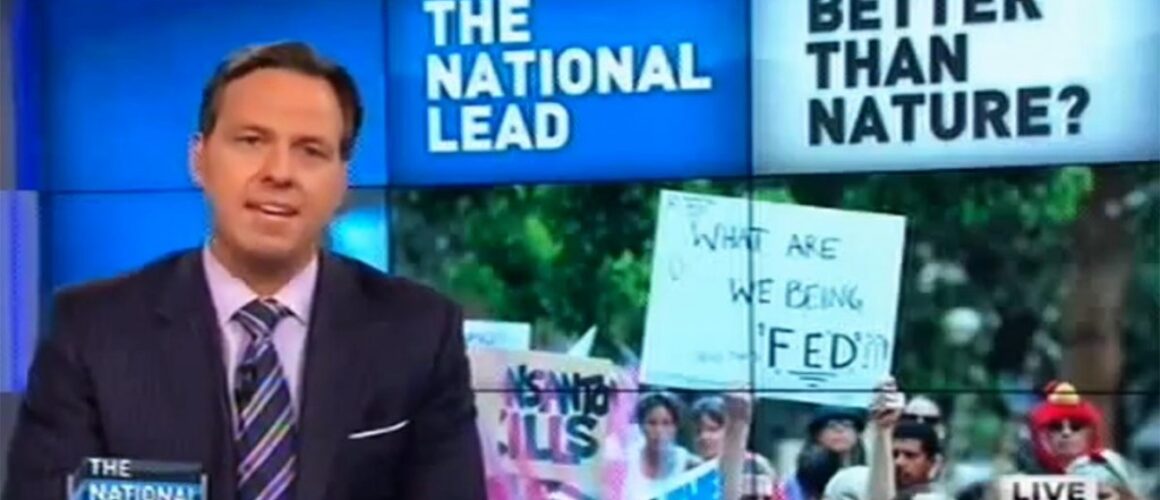CNN Tells the Story of Monsanto in Seven Minutes
In 2013, CNN ran a piece that told the story of Monsanto. It was seven minutes long.
As recent headlines hit about the World Health Organization’s announcement that the ingredient found in Monsanto’s glyphosate is “probably carcinogenic,” it’s worth revisiting the CNN story about Monsanto.
“Now you may not know exactly what Monsanto is, but you probably eat what they produce…every day.”
And with that statement, CNN’s Jake Tapper let Americans know that something had been slipped into our food.
In a riveting seven minute segment, the report teaches the country about a company that has quietly inserted its products into what we eat without our knowing it.
The company that makes these ingredients, a chemical company called Monsanto, may “have previously been best known as being one of the producers of the contributors to the chemical contributing to Agent Orange…believed to have caused disastrous health effects for those who came in contact with it,” reports CNN.
But as the segment goes on to say, “now Monsanto not only delivers pesticides designed to deliver a death blow to living things…it also produces seeds designed to resist those lethal chemicals. And now the company is under fire for these seeds that have been genetically modified and their legislative muscle….as they have defeated efforts to allow labeling of these genetically modified products.”
The company claims that their products are safe and needed to feed the world, but independent science and data out of the United Nations which has a global initiative addressing food waste called “Save Food” and our own USDA suggest otherwise. The USDA recently called for further research into these genetically modified food crops, and both organizations are drawing attention to the issue of food waste.
According to the UN’s Food and Agriculture Organization, “Roughly one third of the food produced in the world for human consumption every year – approximately 1.3 billion tonnes – gets lost or wasted globally” and “Every year, consumers in rich countries waste almost as much food (222 million tonnes) as the entire net food production of sub-Saharan Africa (230 million tonnes).”
Feed the world with a new product by a chemical company or focus on food waste? Obviously, a chemical company has the financial obligation to its shareholders to promote its products as the solution. Reducing food waste doesn’t make any money for a company that has genetically engineered foods to withstand increasing doses of their chemicals.
And while it doesn’t have to be an “either” “or” proposition, addressing the global challenge of feeding the world does require transparency.
So as this chemical company introduced their new products and this new technology into our food supply, a question asked on CNN is one that a growing number of Americans are asking, too: How could you know if you are eating genetically modified foods and feeding them to your family?
As CNN’s Tapper states, “Well, you can’t, and that’s the issue.”
These products and foods derived from them are labeled in over 60 countries around the world, but our very own FDA, relying on industry funded research, states that there is no need for labeling these ingredients because they are substantially equivalent to their conventional counterparts, the soy, corn and canola that existed for thousands of years that are not patented by these large chemical companies.
But the patents on these new ingredients in our food supply, many filed for the first time in the mid 1990s, suggest that there is a substantial difference in these products, substantial enough to make a chemical company a $58 billion dollar corporation with field offices in over 60 countries around the world.
On top of that, there is mounting scientific concern over the health effects of consuming these products and chemicals, and a growing number of countries are choosing to opt out of them in their food supplies. The chemical companies will claim “no evidence of harm.” Without labels, there is no evidence, no way to document the effects of these ingredients on our health, and no accountability, traceability or liability.
So what’s an American to do? It’s worth seven minutes to watch this CNN clip and share it with those that you love.
Because while correlation is not causation, knowledge is power, and in order to address the escalating health care costs in our country and the runaway rates of allergies, asthma, cancer and other diseases in our families, we need to know what we are eating. And the only way that farmers can get an accurate read on consumer demand for their products is if they have a complete data set.
Without labels, there is no way for us to know that we are eating these products and no way for farmers to register consumer sentiment and demand.
The labeling of these ingredients in the food supply is a civil right that has been granted to citizens around the world and the farmers that feed them, and to protect the health of our country, our agricultural system and our economy, it is a freedom that Americans deserve, too.
